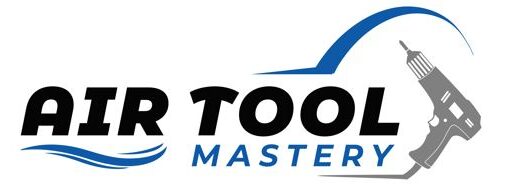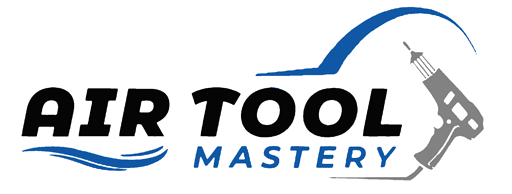Air compressors are integral tools ubiquitous across multiple industries, from automotive workshops to construction sites. These powerful devices harness the force of air pressure to generate energy, which can be used to power different types of air tools. One of the key factors that differentiates air compressors is whether they use oil for lubrication or not.
The importance of oil-free technology in air compressors cannot be overstated. Oil-free air compressors, as the name suggests, operate without the need for oil lubrication within the compression chamber.
This has several key advantages. First, it eliminates the risk of oil contamination, which is crucial in industries requiring high-purity air, such as food and beverage, pharmaceuticals, and electronics. Second, the absence of oil means less maintenance and potentially lower operating costs over time. There’s no need to regularly replace oil, reducing both waste and effort. Last, oil-free air compressors tend to be lighter and more compact, making them ideal for applications where portability is paramount.
How Do Oil Free Air Compressors Work?
Oil free air compressors, or ‘oil-less’ compressors, operate a bit differently from their oil-lubricated counterparts. The fundamental principle of compressing air to generate power remains the same, but the method of lubrication differs.
Unlike traditional air compressors, which use oil in the compression chamber for lubrication, oil-free models use pre-lubricated materials, such as Teflon. These materials are engineered to reduce friction naturally, eliminating the need for additional lubrication.
An oil free air compressor typically has two cylinders, each fitted with a piston. As the pistons move within the cylinders, they pull in air from the environment. This air is then compressed within the piston-cylinder system, generating power.
One key attribute of oil free air compressors is their two-stage operation. In the first stage, air is drawn into the cylinder and compressed to a certain pressure level. It is then transferred to the second cylinder through an intercooler, where it is cooled and compressed further. The resulting high-pressure air is what powers your air tools.
This unique operation system, free from oil, not only ensures clean, uncontaminated air output but also significantly reduces maintenance requirements. However, it’s worth noting that the pre-lubricated components may wear over time and may require replacement—a factor to consider when weighing the lifetime costs of an oil free air compressor.
Tips for Choosing the Right Oil Free Air Compressor
When it comes to selecting an oil-free air compressor, there are several factors to consider. These include:
Required Air Flow and Pressure
The first step in choosing an air compressor is determining the required flow rate (CFM) and pressure (PSI) for your specific application. This will help you determine the appropriate size and type of compressor needed.
Duty Cycle
Some applications require continuous compressed air, while others have fluctuating demand. Be sure to choose a compressor with a duty cycle that matches your needs. A duty cycle represents the amount of time a compressor can run continuously before needing to cool down.
Maintenance Requirements
While oil-free compressors require little maintenance compared to traditional oil-lubricated compressors, they still need regular servicing. Consider the ease of access for maintenance and any potential downtime that may occur during servicing.
Noise Levels
Oil-free air compressors are generally quieter than oil-lubricated compressors, but some models may still produce loud noise levels. If noise is a concern for your application, it’s important to choose a compressor with low sound levels.
Energy Efficiency
Air compressors can be energy-intensive, so choosing an energy-efficient model can save you money in the long run. Look for compressors with features such as variable speed drive (VSD) technology, which adjusts the compressor’s motor speed to match demand and reduce energy consumption.
Portability
Consider where and how you will be using your air compressor. If you need to move it around frequently, look for a compact and lightweight model with wheels or handles for easy transport.
Cost
As with any major purchase, cost is an important factor to consider. While oil-free air compressors may have a higher upfront cost compared to oil-lubricated models, they can save you money in the long run with lower maintenance and energy costs.
Benefits of Oil Free Air Compressors
Oil-free air compressors offer several benefits that make them a popular choice for a variety of applications.
Purity of Compressed Air
One major advantage of oil-free air compressors is the purity of the compressed air they produce. Without oil, there is no risk of contamination from lubricant particles, making them ideal for use in industries such as food and beverage, pharmaceuticals, and electronics manufacturing.
Low Maintenance
As mentioned earlier, oil-free air compressors require less maintenance compared to oil-lubricated models. This can save you time and money in the long run, as there is no need to regularly change oil or replace filters.
Reduced Downtime
Without the need for regular oil changes and filter replacements, oil-free air compressors can also help reduce downtime. This is especially important for businesses that rely heavily on compressed air for their operations.
Environmentally Friendly
Oil-free air compressors are also more environmentally friendly. Since they do not produce oil mist or emissions, they have a lower impact on the environment and meet strict environmental regulations.
Applications of Oil Free Air Compressors
Oil-free air compressors can be used in a variety of industries and applications, including:
- Medical and dental facilities: for clean, oil-free compressed air for medical equipment
- Food and beverage production: to prevent contamination of products
- Laboratory settings: to avoid contamination of sensitive experiments
- Electronics manufacturing: for precise and clean air needed in electronic components
- Spray painting: for a clean and oil-free air supply to ensure high-quality finishes
- Pneumatic tools: for the safe operation of pneumatic tools without risk of oil contamination
The 5 Best Air Compressor Oil Free Models
Here are some of the best oil-free air compressors on the market, based on customer reviews and expert recommendations:
1. California Air Tools 8010SE
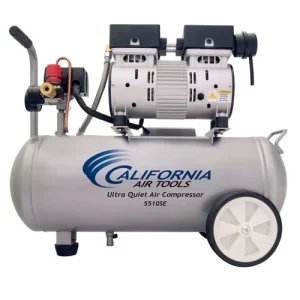
Key Features
- Ultra-Quiet Operation
- Powerful Performance
- Oil-Free Pump
- Fast Tank Fill Time, 130 seconds from empty to full
- Lightweight and Portable, 54 pounds
- Thermal Overload Protector
Description
The California Air Tools 8010SE stands out in the market for oil-free air compressors due to its ultra-quiet operation. This feature, coupled with its powerful performance, makes it an ideal choice for environments that require minimal noise disruption. The oil-free pump eliminates the need for oil changes, reducing maintenance time and costs.
Additionally, it boasts a fast tank fill time of just 130 seconds from empty to full, increasing efficiency and productivity. Despite its robust features, the 8010SE is surprisingly lightweight at just 54 pounds, making it portable and convenient for a variety of applications.
Safety is also a key consideration, with the inclusion of a Thermal Overload Protector to prevent overheating and ensure the longevity of the machine.
2. DEWALT DCC020IB 20V MAX
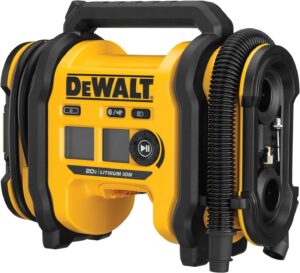
Key Features
- Cordless Operation
- Brushless Motor
- Oil-Free Pump
- High Flow Regulator and Couplers for Maximum Airflow Performance
- Roll Cage Design for Durability and Protection
Description
The DEWALT DCC020IB 20V MAX is a cordless oil-free air compressor that provides the ultimate convenience and flexibility. The brushless motor ensures longer life and superior performance, while the oil-free pump eliminates the need for maintenance.
This model also boasts a high flow regulator and couplers, allowing for maximum airflow performance. Durability is not compromised with the inclusion of a roll cage design, providing protection against impacts and drops.
The cordless operation allows for portability and the freedom to use the compressor in remote locations without restrictions. With a maximum pressure of 135 PSI, this air compressor can handle a variety of tasks, from inflating tires to powering pneumatic tools. The DEWALT DCC020IB 20V MAX is a top choice for those who value convenience and durability in their air compressor.
3. Campbell Hausfeld DC080500 Quiet Air Compressor
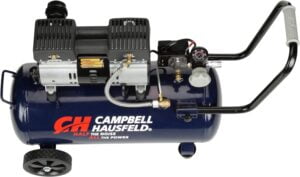
Key Features
- Ultra-Quiet Operation
- Oil-Free Dual Piston Pump System
- 8-Gallon Tank Capacity
- Easy-to-Read Control Panel with Digital Display
- Lightweight and Portable Design
Description
For those looking for a quiet and efficient air compressor, the Campbell Hausfeld DC080500 is an excellent choice. Its ultra-quiet operation at only 68 decibels makes it suitable for use in noise-sensitive environments such as workshops or homes. The oil-free dual piston pump system not only reduces maintenance needs but also increases durability and performance.
With an 8-gallon tank capacity, this air compressor can handle a variety of tasks, from powering pneumatic tools to inflating tires. The easy-to-read control panel with digital display makes it simple to monitor and adjust the pressure settings.
Additionally, the lightweight and portable design allows for ease of transportation, making it suitable for on-the-go use. The Campbell Hausfeld DC080500 is a reliable and efficient choice for any air compressor needs.
4. California Air Tools CAT-1P1060S
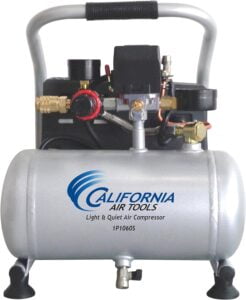
Key Features
- Ultra-Quiet Operation
- Oil-Free Single Piston Pump System
- Lightweight and Portable Design
- Low Amp Draw Motor
- One-Year Limited Warranty
Description
The California Air Tools CAT-1P1060S is another top choice for those in need of an oil-free air compressor. With an ultra-quiet operation at only 56 decibels, this air compressor is perfect for use in noise-sensitive environments such as offices or homes.
The oil-free single piston pump system reduces maintenance needs and increases durability and performance. The lightweight and portable design makes it easy to transport and suitable for on-the-go use. The low-amp draw motor also helps minimize energy consumption, making it a more environmentally friendly option.
With a one-year limited warranty, you can trust in the quality and reliability of this air compressor for all your pneumatic tool needs.
5. Makita MAC2400 Big Bore 2.5 HP
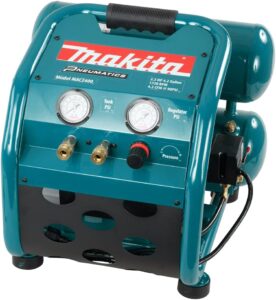
Key Features
- Efficient 2.5 HP Motor
- Big Bore Pump Design
- Cast Iron Cylinder Construction
- Oil-Lubricated System
- Roll Cage and Large Automotive-Style Industrial Air Filter for Durability
Description
The Makita MAC2400 Big Bore 2.5 HP air compressor is a heavy-duty option for those in need of a powerful and durable machine. With an efficient 2.5 HP motor, this air compressor can handle any job with ease.
The big bore pump design allows for faster recovery time and increased performance. The cast iron cylinder construction adds to the durability of this machine, making it a long-lasting investment. The oil-lubricated system ensures smooth operation and reduced wear and tear on the internalAutomotive-Style Industrial Air Filter for Durability components.
Additionally, the roll cage and large automotive-style industrial air filter provide added protection and durability, making it suitable for use in harsh work environments. With a one-year warranty, you can trust in the quality and reliability of this powerful oil-lubricated air compressor.
FAQs on Air Compressors Oil Free
What is an oil free air compressor?
An oil free air compressor does not require lubrication with oil for its operation. Instead, it uses a special coating or material to reduce friction and wear on the internal components.
What are the advantages of using an oil free air compressor?
One advantage is that there is no risk of oil contamination in your compressed air, making it suitable for use in industries such as food and beverage production. Additionally, oil free air compressors are typically more lightweight and compact compared to their oil-lubricated counterparts.
Are there any drawbacks to using an oil free air compressor?
While they offer many benefits, oil free air compressors may have a shorter lifespan compared to oil-lubricated models. They also tend to have lower horsepower and may not be suitable for heavy-duty or continuous use.
What type of maintenance is required for an oil free air compressor?
Due to the lack of oil, these compressors require less maintenance compared to traditional oil-lubricated ones. However, it is still important to regularly check and clean the filters, as well as monitor the condition of the special coating or material used for lubrication.
Can I use an oil-free air compressor for all my pneumatic tools?
It is recommended to check the manufacturer’s guidelines before using any air compressor with specific tools. Some heavy-duty or high-powered tools may require an oil-lubricated compressor for optimal performance and longevity.
Conclusion
When it comes to finding the best oil-free air compressor, it’s important to consider your specific needs and the key features of each option. Whether you need a portable option for on-the-go use or a heavy-duty machine for industrial settings, there is an oil-free air compressor that can meet your requirements.
Consider factors such as motor power, pump design, construction material, and additional features like portability and warranty when making your decision. With proper maintenance and care, an oil-free air compressor can provide efficient and reliable performance for years to come. So invest in a quality oil-free air compressor today and experience the convenience and benefits it has to offer.
